Redditor Steals Neighbor's Cat, Gets Away Flawlessly
Stealing is wrong; we all know that. It has landed many people in jail and has also caused significant trouble for the victims of theft.
However, believe it or not—and this is not just in movies—there are times when stealing might be the right thing to do in a given situation.
And no, we're not talking about stealing gold, money, or someone else's husband. That's a whole other situation we don't want to delve into.
We're talking about stealing someone's pet, who would otherwise be neglected to the point of losing their life. And that's what Redditor PineappleSensitive35 did.
Like most scenarios where these kinds of things happen, it was never intentional from the start. OP had every intention of following their neighbor and leaving their cat be; however, the neighbor made it impossible for OP to keep to themselves.
The cat was clinging to dear life, and OP couldn't just stand by and watch. The kicker, though, is that while OP didn't mean to be a cat thief, they perfectly embodied the part when the neighbor came looking for the cat.
Here's the whole story.
OP asks:

It was painful for OP to watch the cat's health decline; however, wanting to respect their neighbor, they followed what the neighbor wanted.
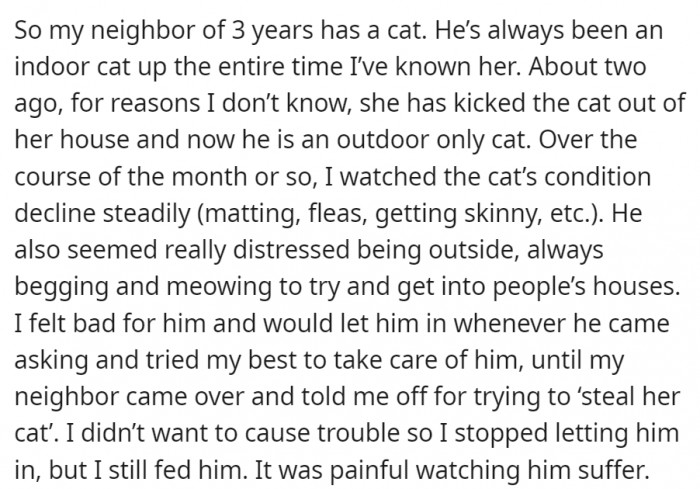
However, OP couldn't stand by any longer when the cat got run over.
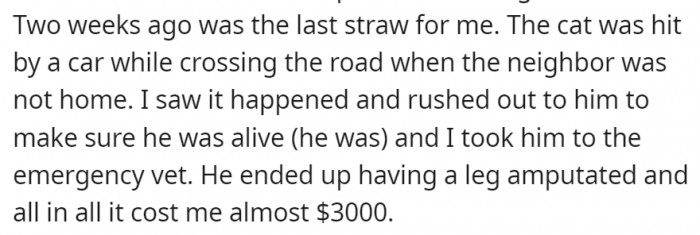
The Psychology of Theft and Justification
The act of stealing, even when seemingly justified by the thief, often stems from complex psychological motivations.
Dr. Dan Ariely, a behavioral economist, suggests that people often rationalize dishonest behavior as a way to align their actions with their self-image.
This cognitive dissonance can lead to a skewed moral compass, where individuals convince themselves that their actions are acceptable.
The Psychology of Theft
The act of stealing, even in seemingly harmless situations like taking a neighbor's cat, can be understood through various psychological lenses.
Research indicates that individuals may engage in theft due to a perceived lack of agency in their own lives, seeking control or validation through their actions.
This behavior can also stem from impulsivity or a lack of consideration for others, highlighting the importance of empathy in social interactions.
And OP kept it all a secret.
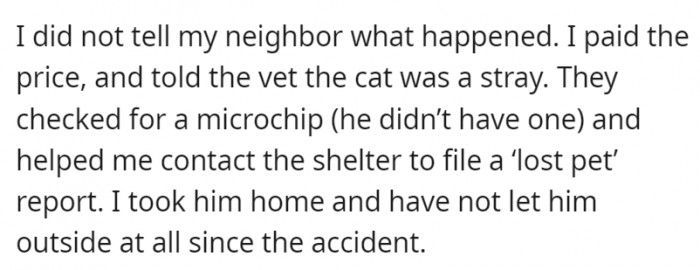
OP also had the perfect response when the neighbor came asking about her cat.
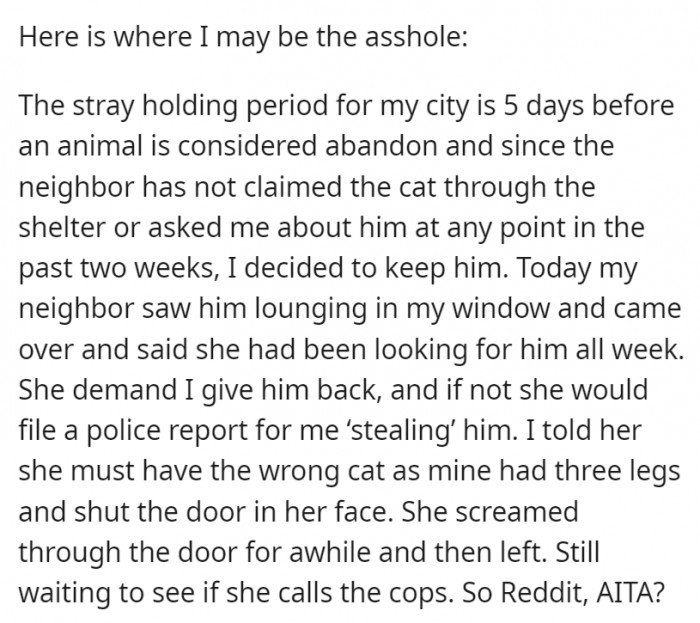
And while the neighbor is upset over the loss of her cat, OP has firmly decided to keep the kitty.
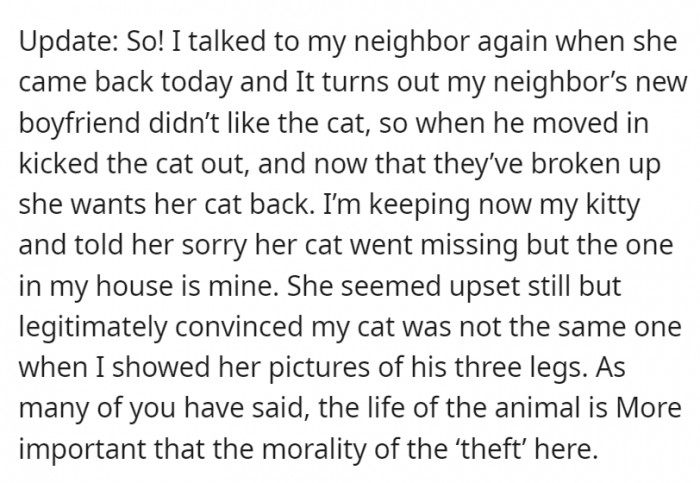
Research in the Journal of Behavioral Decision Making indicates that situational factors can heavily influence unethical behavior.
When individuals perceive that their actions are unlikely to be caught or that they are acting against a perceived antagonist, they may engage in theft without significant guilt.
This underscores the importance of context in understanding moral decision-making.
Moreover, the social dynamics of neighborhoods can influence such behaviors.
According to studies in community psychology, individuals may feel a sense of entitlement to communal resources, leading to justifications for their actions.
This sense of ownership can distort social norms and expectations, complicating relationships within the community.
Morally, what OP did wasn't right. But realistically, what they did was incredible!
OP saved that cat's life at the right moment. If they hadn't, that poor kitty would have been a goner.
And while the neighbor is upset about the loss of her cat, she should have thought twice before leaving it out and neglecting it in the first place. Many people in the comments section agree and are also applauding OP for saving the cat.
Here are some of the best comments.
1. OP wasn't lying. It was all fact.

2. It's not the same cat at all.
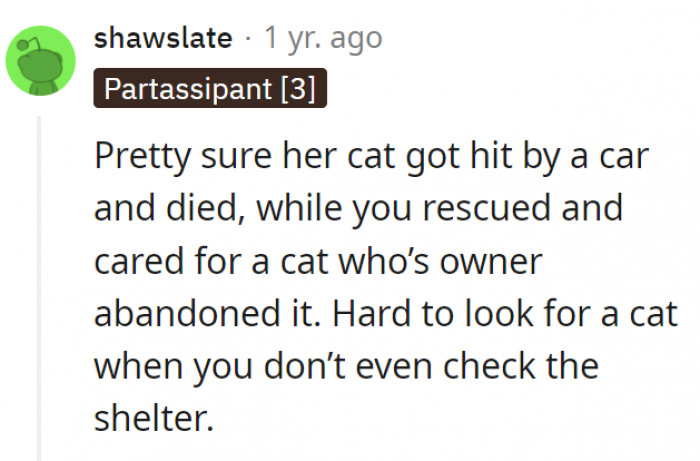
3. The cat has gotten a new and better life thanks to OP.

Social Dynamics of Neighborhood Conflicts
Neighborhood dynamics can often exacerbate petty theft, as social psychologists have noted.
Dr. Michelle Gelfand's research on cultural tightness and looseness highlights how norms within communities can shape individuals' behaviors.
In tight-knit communities, the fear of social repercussions can deter theft; conversely, in looser communities, perceived anonymity may embolden such acts.
Implications of 'Getting Away with It'
Interestingly, the thrill of 'getting away with it' can reinforce problematic behaviors.
Research shows that individuals who experience a reward for their actions, such as not facing consequences, may be more likely to repeat those behaviors in the future.
This creates a cycle of risk-taking that can escalate over time, underscoring the necessity of accountability in community interactions.
4. They're two souls who found one another at the right time.

5. The neighbor doesn't deserve to own any pets at all.
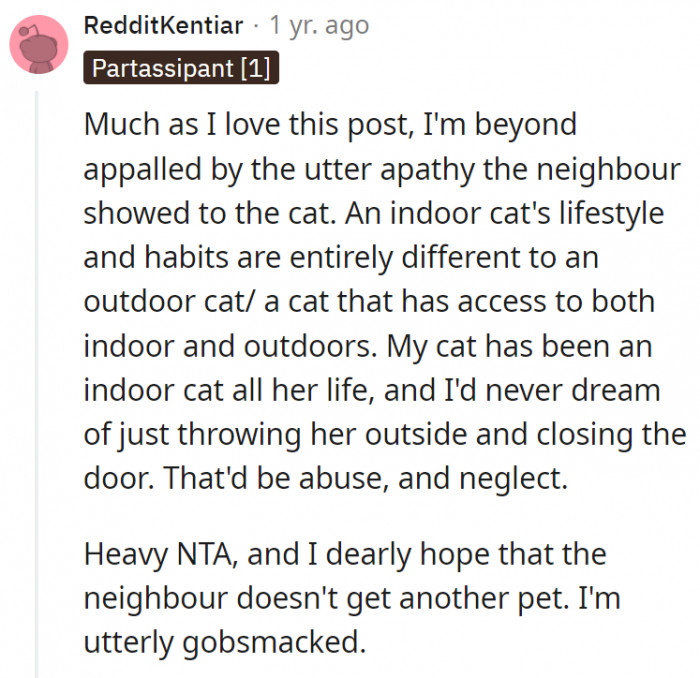
6. OP did technically follow everything by the book.

Understanding the motivations behind theft can inform more effective community interventions.
Programs that foster trust and cooperation among neighbors can reduce incidents of theft by strengthening social bonds.
Encouraging open communication can also help address grievances before they escalate into conflict.
On the other hand, feelings of guilt or anxiety that may arise after such actions can lead to significant emotional turmoil.
Trauma specialists note that unresolved feelings can manifest in various ways, including increased stress and relational difficulties.
Addressing these feelings through open communication and self-reflection is crucial for personal growth and community harmony.
7. OP obeyed the law, and justice has been done.
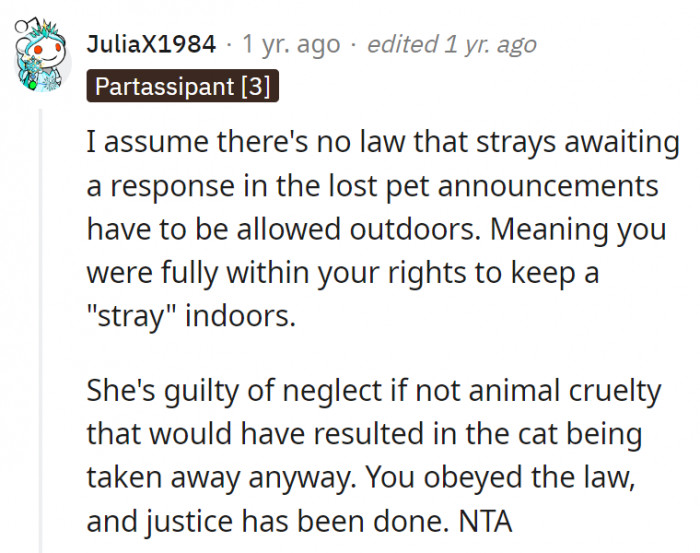
8. Fellow justifiable pet thieves call OP a hero.

They also saved a little dog from irresponsible owners.
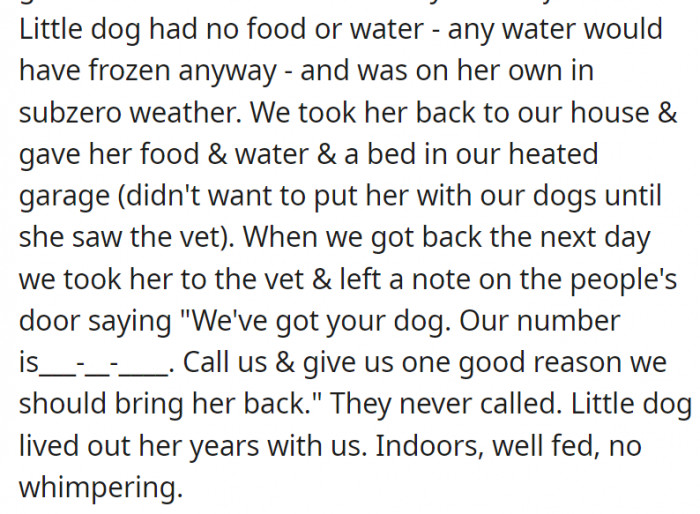
Practical Solutions for Resolving Conflict
To effectively address theft and neighborhood disputes, community-building initiatives can be instrumental.
Research suggests that organized neighborhood events can enhance social cohesion and decrease crime rates.
By creating opportunities for positive interactions, communities can foster an environment that discourages unethical behavior.
Navigating Neighborhood Relationships
Building strong neighborhood relationships can mitigate the likelihood of such incidents occurring in the first place.
Research from social psychology indicates that fostering a sense of community can enhance accountability and empathy among neighbors.
Engaging in communal activities and strengthening connections can create an environment where individuals are less likely to engage in harmful behaviors.
They also say that OP deserves a pat on the back.

9. The neighbor should just admit she did wrong by the cat and hope it is somewhere safe.
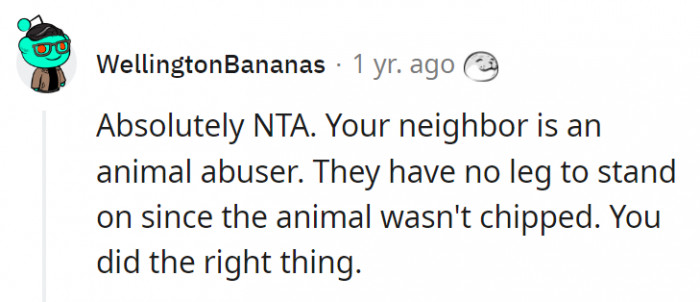
10. She cared only until she didn't, as it turns out.
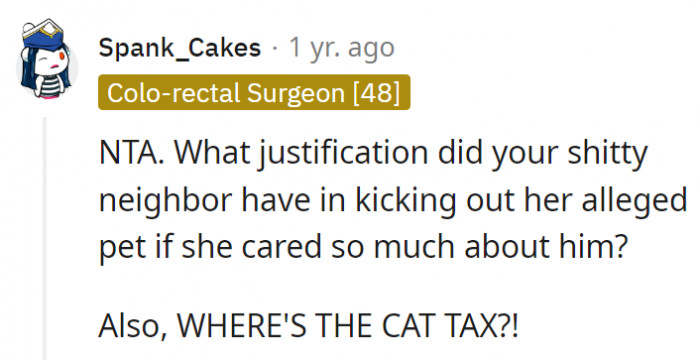
Additionally, implementing clear and fair systems for conflict resolution can help mitigate petty theft.
Encouraging mediation and dialogue can provide a platform for addressing grievances without escalating to theft or retaliation.
Communities that prioritize conflict resolution often experience lower levels of crime and greater trust among residents.
Finally, it's essential to remember that behavior often reflects underlying motivations and unmet needs.
Understanding the psychological factors driving actions can lead to more effective resolutions and healthier relationships.
By focusing on empathy and communication, communities can address issues constructively rather than punitively.
11. The lies were needed to do what was right.
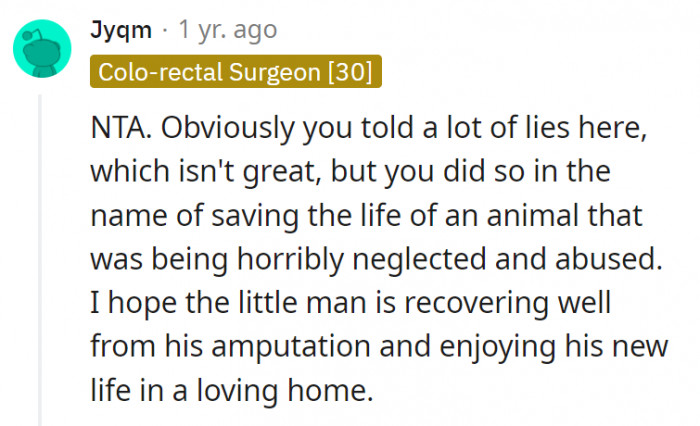
12. OP was speaking facts most of the time, though.
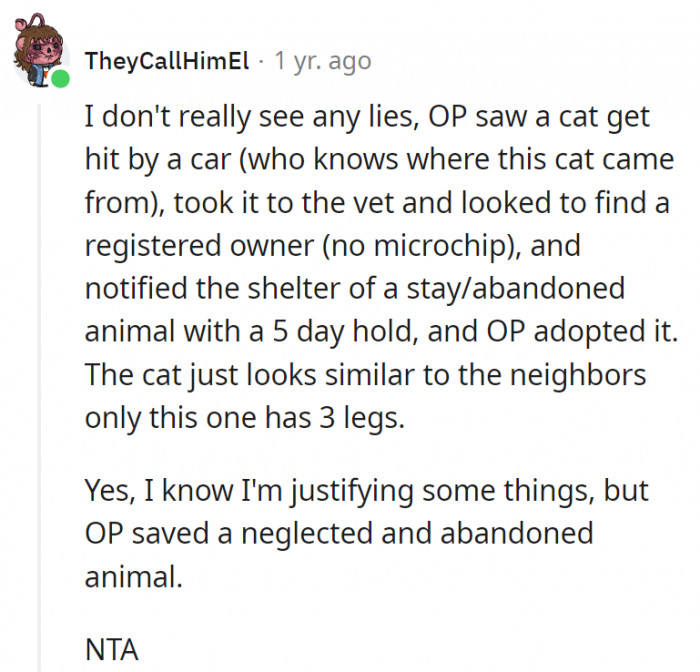
13. The cat deserved better than that neighbor.
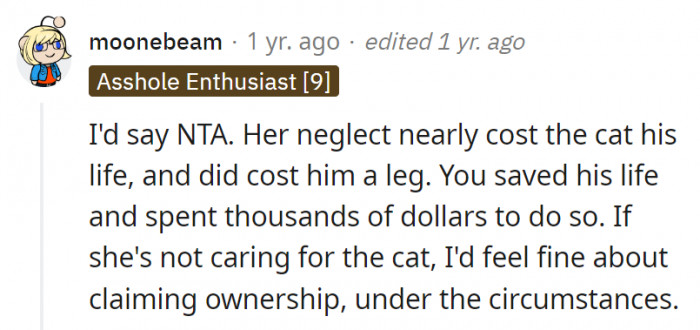
14. Finders keepers!
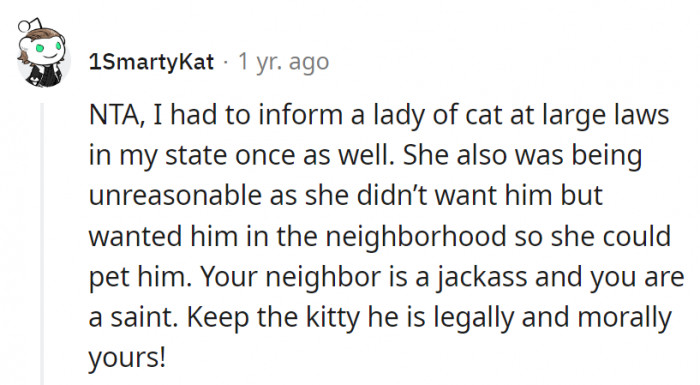
15. Might not be right, but it is still right.

16. OP also has proof of ownership for the cat.
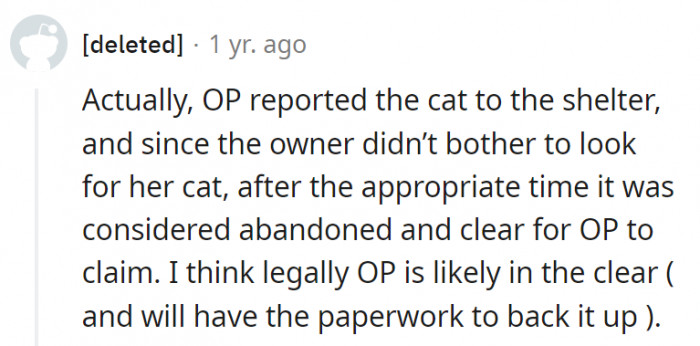
17. It's not stealing when you're saving the kitty from certain neglect.
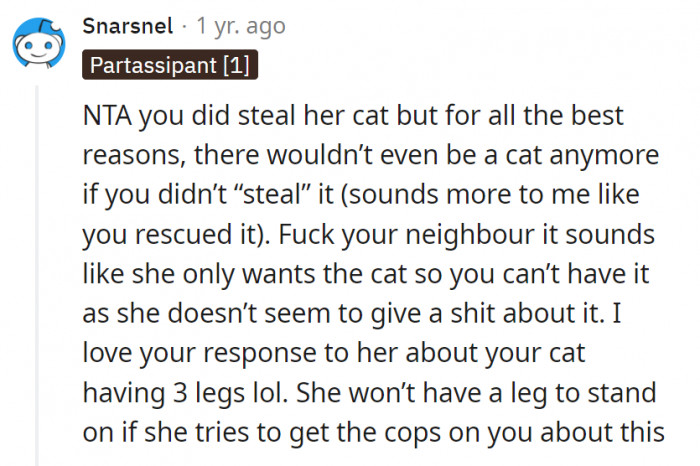
18. OP really knows how to act the part of a master kitty thief.

19. OP is probably the cat's hero too, although it may never admit it.
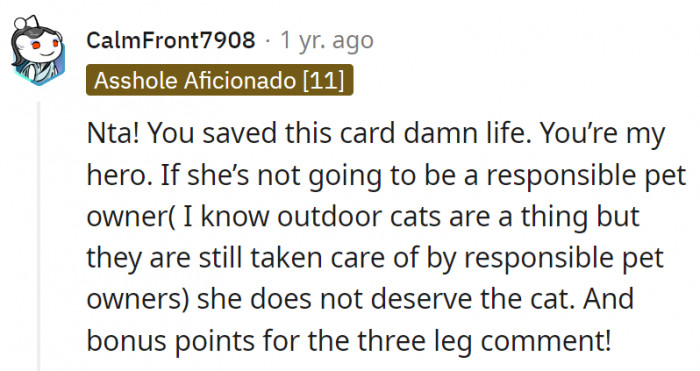
20. The cat's well-being above all things.
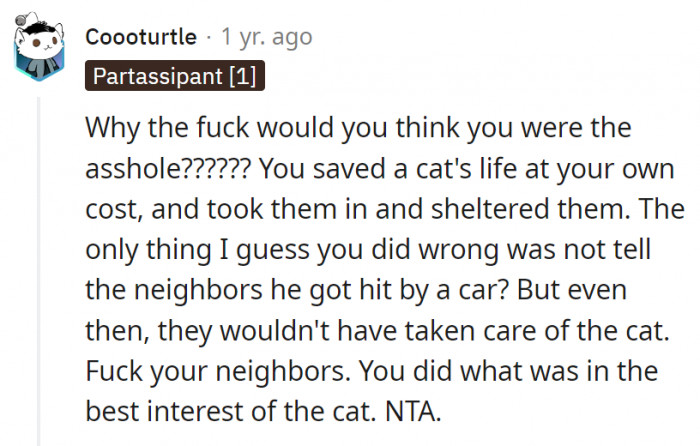
OP might have stolen the cat, but they're still a hero for what they did. They weren't obligated to take the cat to the vet and pay for the bills, yet they did.
If they hadn't, the cat would have died on the road, and the neighbor might still not have thought about looking for the cat. Thankfully, OP was there.
Tough luck for the neighbor, but the cat is better off with OP. Hopefully, they will have many more happy years together.
Psychological Analysis
This behavior illustrates common psychological motivations, such as a desire for control or validation.
Recognizing these underlying factors is crucial for addressing such actions constructively and fostering better community relations.
Analysis generated by AI
Analysis & Alternative Approaches
In conclusion, understanding the psychological motivations behind actions like theft can help communities navigate complex social dynamics.
According to research in community psychology, fostering empathy and accountability is key to preventing negative behaviors and building stronger relationships.
By addressing underlying needs and encouraging open dialogue, neighborhoods can create a more supportive environment for all residents.
Analysis & Alternative Approaches
The interplay of psychological motivations and social dynamics reveals the complexity of theft in community settings.
According to various psychological studies, understanding the contextual factors at play can lead to more effective interventions.
By fostering cooperation and communication, communities can create environments that discourage theft and promote social harmony.



